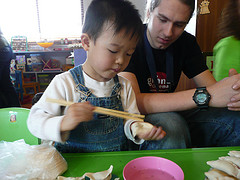What is foster care? How long does it last?

Half a million children live in foster homes, group homes, emergency receiving homes, or child-crisis centers across the U.S. Twenty-four percent of these children spend between one to two years in out-of-home care.
There are many reasons why young people are moved to out of- home care, including neglect, abandonment, or child abuse. If the state learns that a child is being maltreated in some way, the child may be removed. It′s the state′s responsibility to protect its children. If removed, a child is either placed with relatives, friends, or—as a last resort—into a foster home.
- In 2003, 906,000 kids and teens in the
U.S. ages 17 and under were reported
as victims of child maltreatment.- Neglect accounts for 61% of maltreatment
reports, followed by physical
abuse (19%), sexual abuse (10%),
and emotional maltreatment (5%).- In 2003, 297,000 kids and teens
entered foster care; 40% were
between the ages of 11 and 18.Source: Juvenile Offenders and Victims:
A National Report, National Center for
Juvenile Justice (2006)
The people who operate foster homes are licensed, trained, and monitored by a state agency— usually Child Protective Services (CPS). If you′re placed in foster care, you′ll receive medical, dental, psychological, and educational services.
An attorney or guardian may be appointed to look out for you and to discuss your situation and represent you in court. Depending on your age, you may have the opportunity to appear in court with your lawyer. The judge may want to hear from you about your situation.
The goal of every court and agency responsible for your care is to work toward finding you a permanent home. This may mean returning you to your parents when they′re ready to provide safe care, or finding you an adoptive home. A lot depends on why you were originally placed in foster care. If the problems have been solved and you can be safely returned to your parents, the court may allow it. Otherwise, after you′ve spent six to twelve months in foster care, other plans will be considered.
State laws regarding your rights and your parents′ rights have changed in the past few years. Parents are required to show by their actions, not words, that they intend to work toward your return. They must resolve whatever problem caused you to be placed in foster care—by, for example, getting counseling, going into drug rehabilitation, or taking parenting classes. If too much time passes without any positive results, alternative plans must be made.
Although there′s no time limit on a foster home placement, state and federal laws discuss a “permanent” home for all children. This may mean a return to your parents, placement with relatives or friends, or adoption. Each case is considered on an individual basis by the courts and social workers.

Photo by Shazari (Flickr)
You don′t lose any rights while you′re in foster care. The agency responsible for you must see that all of your needs are met and that you′re in a safe environment.You should receive medical and dental care, as well as schooling and recreation. In foster care, you have to follow house rules regarding hygiene, curfew, and study and recreation time.
Once you turn eighteen and become an adult, foster care may end. Some states allow you to remain in foster care if you′re still in high school or if special circumstances exist. If you still need care after you′re eighteen, Adult Protective Services (APS) may provide it.
A study of child abuse and neglect in the United States was released in October, 2011 by the British Broadcasting Corporation. Reportedly, the U.S. has the worst child abuse record in the industrialized world. See the report here: http://www.bbc.co.uk/news/world-us-canada-15288865
In July, 2012, the Department of Health and Human Services reported a decrease in the number of U.S. children in foster care. As of September, 2011, there were 400,540 foster children compared to 406,412 a year earlier. The drop is explained as a result of policy changes, shortened stays in foster care, expedited adoptions and expanded preventive support for troubled families.


